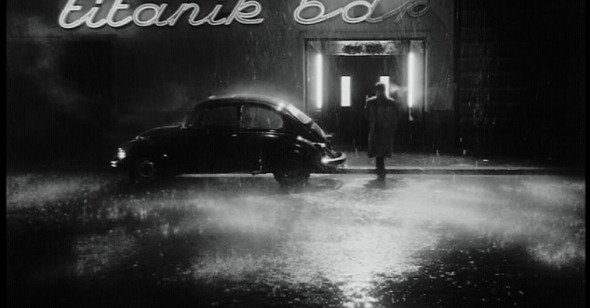Damnation
Dir. BĂ©la Tarr, Hungary, 1988
by Nick Pinkerton
Included in the package for Damnation and Werckmeister Harmonies is a small booklet of articles about the works of Béla Tarr, entitled: “A Cinema of Patience.” So anemic is this heading it might as well have been entitled “A Cinema of Boring Shit;” Tarr’s films are exhilarating, and to describe the work of an—ahem—leisurely filmmaker like him as “A Cinema of Patience” is yet another instance of the impossibly poor linguistic framing that helps keep foreign films from reaching wider audiences. Luckily (I guess), one would actually need to purchase one of these new Tarr DVDs to even make it to the essays, so this clever turn of phrase won’t actively turn the curious off, but, oh, to think about what could be done to turn people on to one of world cinema’s most talented, visionary living filmmakers. Putting out his entire filmography on DVD in solid transfers (not pristine, but definitely watchable) is more than a start, so I suppose I’m quibbling with the fine folks at Facets in criticizing a portion of what is, overall, a hugely worthy endeavor. But I can’t help but think of Tarr as one of those filmmakers—one with an aesthetic so controlled and beguiling, a sensibility so defined and curious, and works that front like they’re daunting but are surprisingly accessible and emotional—where there might be a lot of audience ground to be gained if only the films were discussed in the right ways.
Sure, the seven-plus hours of Sátántangó may not be for every art-film lover, but I have a hunch that Werckmeister Harmonies (a paltry two-and-twenty) could be. And Damnation, which preceded Sátántangó and marks the beginning of the recognizable Tarr aesthetic—a world of cinematographer Gábor Medvigy’s beautiful blacks and whites, where shots generally equal sequences allowing ample space for composer Mihály Vig’s yearning themes to roam and where novelist and screenwriter László Krasnahorkai’s words pit melancholy against absurdity for narrative primacy—isn’t a bad place to start examining Hungary’s most prominent filmmaker. Imagine mating the quotidian impulses of early Jarmusch with Lynch’s baroque chiaroscuro in some of kind of post-Communist Double Indemnity, and you’d wind up not far from Damnation, the most narratively rigorous (while still remaining tantalizingly oblique) and least lengthy of Tarr’s films that I’ve seen.
Damnation follows the efforts of lovelorn pseudo-intellectual and general layabout Kerrer to permanently separate the local cabaret singer with whom he’s been having an affair from her thuggish husband Sebastyén. At the opening she’s just broken things off, but opportunity arises in the form of a smuggling operation masterminded by a local bar owner who needs a driver for hire. Kerrer’s without a car, but Sebastyén has a vehicle and need for quick cash to support his spendthrift wife. Kerrer eagerly puts his nemesis forward for the job, even openly forecasting his failure in a terrifically uncomfortable exchange. Sebastyén proves willing to assume the risk and off he goes, leaving Kerrer and the Singer (she’s never named) to their own devices for a few days. During this interim, Kerrer is repeatedly approached by a grave older woman/prophet figure (she also works the coat check at the cabaret), who spouts unsettling Biblical quotations and offers other dire predictions for the future of his little endeavor.
From my description Damnation might sound blessed with a nicely twisty noir plot, and it is, though one stretched to the breaking point (Siodmak could have dispensed with all of this in 89 minutes; Tarr takes 122). Tarr’s less concerned with narrative machinations than the play of light off of bodies in bed, a face while shaving, Kerrer’s musings on the universal order of things, rain drenching the concrete walls and debris-ridden courtyard of a crumbling apartment block, wonderfully drunken revelry in the cabaret, or its final image: Kerrer on all fours, snarling and swirling around a belligerent wild dog. Damnation may be, in the end, primarily a mood piece, an exemplar of the fading art of tonal control. As with Werckmeister and Sátántangó it’s the images, not the words that linger, though the poetry of Krasnahorkai’s dialogue surely reveals itself with repeat viewings. Moody, but lovely, a touch cruel, but never really bleak, and, perhaps most importantly, never far from absurdity, Damnation isn’t as sublime an introduction to Tarr as Werckmeister Harmonies, but if you’re trying to figure out where to go next, this is the place before diving into Sátántangó. All three earn their lengths: Tarr’s cinema is, yes, patient, and beautiful, apocalyptic, and much more. Maybe instead of scrimping on the superlatives, we should just call it simply some of the best stuff going.
